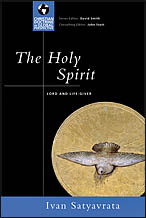Ivan Satyavrata: The Holy Spirit
Editor’s Note: This is the full review of Ivan Satyavrata, The Holy Spirit: Lord and Giver of Life. For the Review in Brief, see the full Summer 2010 issue of Pneuma Review.
 Ivan Satyavrata, The Holy Spirit: Lord and Giver of Life, Christian Doctrine in Global Perspective Series (Downers Grove, Illinois: IVP Academic, 2009), 182 pages, ISBN 9780830833078.
Ivan Satyavrata, The Holy Spirit: Lord and Giver of Life, Christian Doctrine in Global Perspective Series (Downers Grove, Illinois: IVP Academic, 2009), 182 pages, ISBN 9780830833078.
The Holy Spirit is part of a joint project between Langham Trust and IVP. The author, Ivan Satyavrata, is President of Buntain Theological College, Chairman of Asia Theological Association in India, and an ordained minister of the Assemblies of God. In nine chapters, Satyavrata articulates a pneumatology that is rooted in the authority of Scripture, and that is historically sensitive about the diversity of doctrinal understandings of the Holy Spirit. It is also intended as a contribution that illuminates a non-western pneumatology in so far as the series, edited by John R.W. Stott and David W. Smith, seeks to present a biblically faithful and contextually relevant set of Christian doctrines from non-western perspectives, for both western and non-western Christian readers. Hereafter, I will summarize Satyavrata’s main ideas, and then offer a critical assessment.
Satyavrata’s quest is to discern the Spirit against the backdrop of an increasingly post-Enlightenment world, and to show sensitivity of pneumatology in the western and eastern hemisphere. In chapter one, he explains the reasons for a surging pursuit of religious experience and captivation with eastern spirituality among the youth in post-enlightenment western societies. He attributes this quest for authentic religious experience as a reaction to and a disillusionment of the cold, logical, deductive reasoning and objective academic analysis inherited from the Enlightenment. If this trend is not curtailed, subjective experience will eventually become the final authority on truth. This leads to the danger of religious pluralism and the subverting of the authority from which truth is to be discovered.
The larger backdrop for Satyavrata’s pneumatology is his historical account of “the Spirit in the life of the Church.” In twenty-eight pages, chapter two provides a broad and sweeping snapshot of renewal in Christian history. The aim is to show the Spirit’s pervasive activity in the Church over the last twenty centuries – from the earliest Christian community’s experience of the Spirit, to the Church Fathers (such as Justin Martyr, Clement of Alexandria, Tertullian, Cyril of Jerusalem, Basil of Caesarea), to the “Sectarian Spirit Movements” represented by Gnosticism, Montanism, Joachimism, Friends of God, Irvingites of Roman Catholicism, to Christian Mysticism (such as Bernard of Clairvaux, Martin of Tours, Benedictine Hildegard of Bingen, Francis of Assisi, Anthony of Padua, Catherin of Siena, Vincent Ferrer, Teresa of Avila, Meister Eckhart, John of the Cross), to the Reformation Christianity of Martin Luther, John Calvin, Ulrich Zwingli, Thomas Muentzer, and to modern ‘Spiritual Renewal’ movements (such as Puritanism, Pietism, Quakerism, Quietism, Revivalism [of John Wesley, George Whitefield, Jonathan Edwards, Dwight L. Moody], Evangelicalism, the Holiness movement, and Pentecostalism). The crux of this chapter is that “Spirit-renewal,” such as the Pentecostal renewal since the twentieth century, occurs all through the centuries. The Church struggles historically with the limits and validity of organization versus renewal, form versus freedom, and ritual versus charismata, and the tensions will probably continue until the End of the Age. The tensions are evidence that the Church has been trying to correct the excesses of renewal movements.
In chapter three, Satyavrata discusses four aspects pertaining to the nature and character of God the Spirit in the Old Testament. He is the creative Spirit who “is continually creating and ceaselessly active in directing the processes of the natural world” (p. 55). As such, “the Spirit’s role in creation ensures he is everywhere and must not be excluded from any aspect of human experience” (p. 55). He is the enabling Spirit who equips his chosen ones for leadership and for roles he predisposes, both in the religious and in the ‘secular’ arenas. As the prophetic Spirit who inspires, God the Spirit is the channel of communication between God and people – both in ethically neutral issues and in moral grounds. Finally, he is the universal and messianic Spirit who promises God’s redemption for humanity – foreshadowing the eschatological Spirit of the New Testament who is poured out at Pentecost and who indwells believers.
Category: In Depth, Summer 2010


